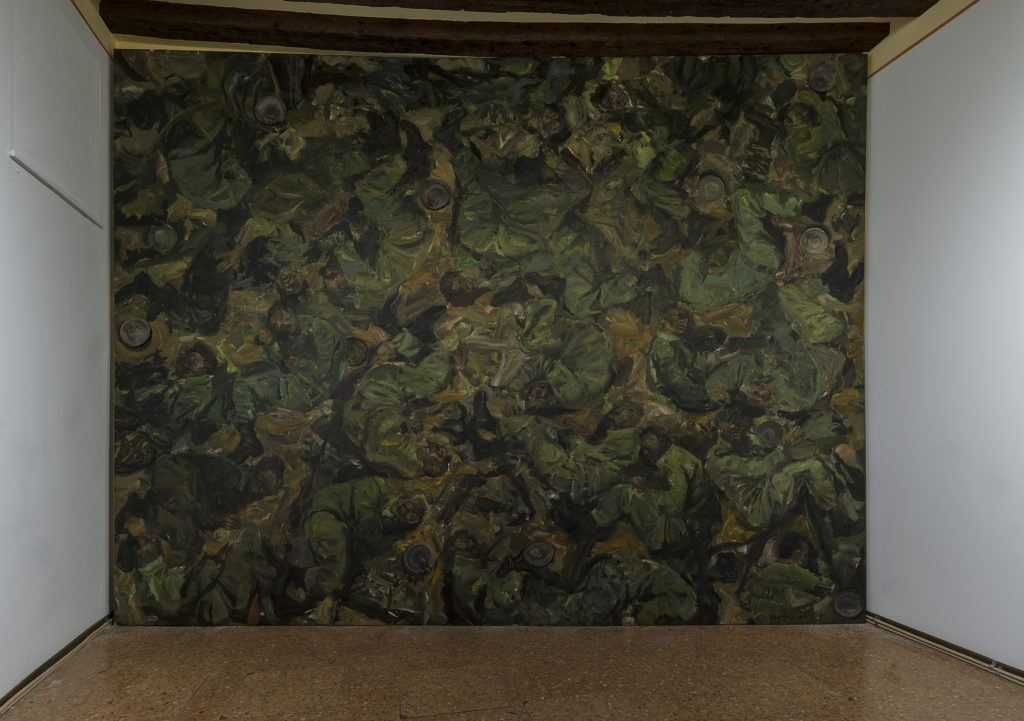Politics
The Organizers of Iraq’s Venice Biennale Pavilion Have Closed the Show in Solidarity With Anti-Government Protests Rocking the Country
The foundation behind the pavilion is calling for a strike by cultural institutions in Iraq.

The foundation behind the pavilion is calling for a strike by cultural institutions in Iraq.

Taylor Dafoe

The Iraqi pavilion at the Venice Biennale has been closed in solidarity with the anti-government protests playing out in the Middle Eastern country. The exhibition was set to be on view as part of the international art festival through November 24.
The Ruya Foundation, a Baghdad-based non-profit responsible for commissioning the national pavilion since Iraq participated in 2013, is calling for a “strike” by the country’s cultural institutions. The foundation announced the news last week, dubbing the closing a gesture of “solidarity with the popular uprisings of youth that broke out in Iraq against state corruption and the deterioration of economic and living conditions.”
“We condemn the use of violence against peaceful protesters and the bloodshed that has led to the deaths of more than 265 protesters to date,” reads the Foundation’s statement, released on November 5. (Since then, the number of deaths related to the demonstrations has reached over 300, according to some news outlets.) “Peaceful protest is a fundamental right, enshrined in Article 38c of the Iraqi Constitution.”
We condemn the use of violence against peaceful protesting, a basic right, enshrined in Article 38.c of the Iraqi Constitution. As the commissioner of the Iraq Pavilion at the 58th Venice Biennale 2019, we have decided to close the Fatherland exhibition. https://t.co/E2IY4ZQA5Y pic.twitter.com/rUXusRekka
— Ruya Foundation (@RuyaFoundation) November 5, 2019
Signs with the same language have been posted outside the shuttered pavilion in Venice. The Foundation has also closed its gallery and library in Baghdad, the Ruya Shop, until further notice.
“The Pavilion is a representative of Iraq abroad and we as a cultural NGO do not wish to remain silent in the face of official violations against unarmed protesters with rightful demands,” Tamara Chalabi, director and co-founder of the Ruya Foundation, tells Artnet. “[Our foundation] stands in defense of the basic rights of Iraqi citizens, in particular, the right to peaceful protest. We have consistently worked to improve cultural life in Iraq and an essential component of that is non-violent freedom of expression. Recent government activity stands in direct contravention of our values and mission.”
The Venice show, featuring paintings by Iraqi-Kurdish artist Serwan Baran, was entitled “Fatherland.” Baran, a former member of the Iraqi military who, during the Gulf War, was conscripted to paint the scenes of conflict for government propaganda, is the first artist to represent the country solo at the Biennale. He revisited martial imagery for “Fatherland,” albeit without the chauvinistic bent, depicting through expressionistic brush strokes weak generals and slain soldiers. He told the Art Newspaper that he supported the closure: “I say loudly, the people will prevail as long as we are with them.”

Installation view of Serwan Baran’s “Fatherland.” Photo: Danto Productions. Courtesy of the Ruya Foundation and the artist.
On October 1, hundreds of thousands of demonstrators took to the streets of cities throughout Iraq, protesting the government corruption, rampant unemployment rates, and failing public utilities. Since then, the protests have grown increasingly violent as state security forces have turned to snipers, tear gas, and water cannons to quell the crowds.
Comparing the Iraq protests to those unfolding in Algeria, Lebanon, Syria, Sudan, and elsewhere in the world, the Ruya Foundation lauds the street protests as a response to “raging social and economic conflict and the need to bring about real change, and to attain more civil rights against the ruling elites in Iraq that have come to the brink of confiscating the country,”
“Ruya Foundation is proud to participate in the realization of this local, regional and global yearning for dreaming, thinking and struggling to adopt new and comprehensive visions for all, especially the younger generations that are at the forefront of this change.”